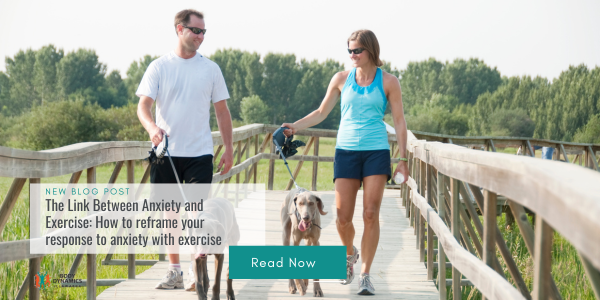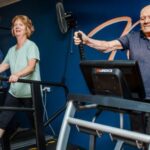We all know that exercise helps to keep our bodies healthy. But there’s also growing evidence to suggest that exercise can be great for our minds as well. Researchers are increasingly exploring the relationship between anxiety and exercise and how we can use this knowledge to manage and treat anxiety more effectively.
It’s natural to experience stress and anxiety. But anxiety disorders, affecting one in six or roughly 3.3 million Aussies, are Australia’s most common mental disorder. Anxiety and exercise are an obvious pairing due to the well-known mood-boosting benefits of physical activity. But the connection may run much deeper, with exercise potentially making a great tool to reframe our response to anxiety and panic.
Mood boost: Anxiety and exercise in the short term
If you’ve ever gone for a run or walk after a stressful or anxious day, you likely felt better afterwards. This fast-acting mood boost is largely thanks to the release of dopamine and endorphins triggered by your physical activity. These neurotransmitters are known as your body’s natural “feel-good” chemicals because they help promote feelings of pleasure, reward and overall well-being. This makes exercise a useful tool to deploy when anxiety rears its head.
Reframing fight or flight: Anxiety and exercise in the long term
Researchers are also exploring how regular exercise can help people manage, treat and prevent anxiety over time. When we feel frightened or threatened, our nervous systems react with a series of responses like sweating, dizziness and a racing heart. For those more sensitive to anxiety, these sensations can evoke fear, and these people may be more susceptible to developing a panic disorder.
However, evidence suggests that regular exercise could benefit anxiety-prone people, helping them become less susceptible to panic during these fight-or-flight sensations. Interestingly, exercise prompts similar physical reactions to anxiety, such as increased heart rate and sweating. As a result, it can be likened to exposure treatment, where people learn to associate these sensations with safety rather than danger. Consequently, experts have proposed that physical activity may serve as a treatment and preventive measure against anxiety and panic attacks.
This effect is linked with the positive impact of exercise on the brain’s reward system. This part of the brain is responsible for feelings of pleasure, motivation and hope. Research asserts that, with regular exercise, the brain’s reward system transforms, resulting in increased levels of dopamine circulating in the body and more dopamine receptors becoming available. As a result, exercise not only helps alleviate anxiety but may also enhance your ability to experience positive emotions, even in stressful or anxiety-triggering circumstances.
Putting it into practice
Simply knowing that anxiety and exercise are two sides of the same coin doesn’t automatically change how our bodies respond to anxiety. Nor does it make starting a new exercise program any easier. Many people who experience anxiety may have anxious feelings about exercising. Consequently, it’s a good idea to seek professional help from a psychologist or an exercise physiologist to get you started on your anxiety and exercise journey.
It’s important to understand that psychology and exercise physiology are vastly different disciplines. But both can benefit someone who experiences anxiety in different ways. For example, a psychologist may be able to help you break down the mental barriers that make exercising an anxious experience. In contrast, an exercise physiologist can offer guidance that helps you feel confident and more at ease as you exercise. In some cases, engaging an expert from both professions may be your best option.
Getting started
If seeking help from a professional is not feasible for you, here are a few tips to kickstart your anxiety and exercise journey.
- Start slow: Too much, too soon could turn you off exercise. It’s okay to begin by walking a few times per week and building your activity levels up from there.
- Exercise regularly: Consistency is key when it comes to anxiety and exercise. Many people skip working out when they’re not feeling their best, but this is actually a great opportunity to leverage the full instant mood-boosting effects of exercise.
- Vary your exercises: A mixture of light and heavy cardio and strength training keeps things interesting and offers a range of brain-friendly benefits. You can even add yoga in for a mind-body boost.
- Take it outdoors: People who engage in physical activity while outdoors tend to report higher levels of vitality and pleasure while experiencing lowered tension and depression.
- Be kind to yourself: It’s easy to feel overwhelmed when starting a new exercise routine. Try to go at your own pace, find a form of exercise you enjoy, and don’t compare yourself to others.
We’re here to help
If you’re ready to start reframing your anxiety through exercise but need a helping hand, we recommend seeking professional guidance from a trained exercise physiologist like us.
Contact us today for more information on how we can work together!










